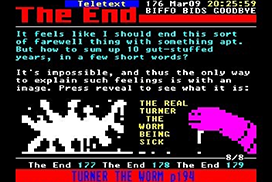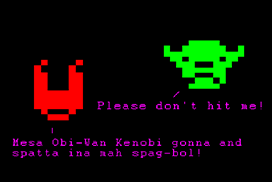
Page 28, press hold, and reveal. Digitiser's founder speaks out

|
Script for a tester's tear
Edge #137, June 2004
Talent abuse is a common whinge among creative people, but one that isn't without some basis in reality. In this consumerist society, most outlets for creatives are controlled by big businesses whose sole function is to make money. The grand irony here is that most creative types only moan about the lack of respect because they want to make more money out of their 'art' than they currently are. Oh, sure, they'll berate their fellow artists when they 'sell out', but it's not always easy to produce anything other than a cloud of noxious bottom gases when the taxman, the landlord and the credit card lady are rubbing their swollen stomachs up against your patio windows.
Radiohead might have dressed up their money-making with plenty of right-on integrity and supposed artistic independence, and they may have banned corporate sponsorship from their gigs, but they still travel home in gold-plated hover-limos driven by chauffeurs cloned from astronauts, and when they get home they eat pies full of edible cheques. Or so someone told me.
In my professional capacity, I have straddled the worlds of music, film, TV and gaming (not just because I've been paid to sleep with executives from all four) and it's games that are the most afflicted by talent abuse. At a recent industry summit, disillusioned Naught Dog boss Jason Rubin announced he will be leaving the company he co-founded as soon as soon as work on Jak & Daxter III is complete. He slated the industry's current publisher-led structure, urging developers to rise up and slay the evil publishing dragons and their fascistic, numbers-fuelled marketing departments. "Talent must force the change," bellowed brave Sir Jason, waving a broadsword above his unnecessarily naked body for emphasis.
Rubin has a point, though, even if it is one we've heard before. One glance at the games charts and it's clear the industry orbits around licensed product and well-milked cash cows. It's almost as if the industry has lost its nerve. Gone are the days when gaming was led by its own brands, now we're all forced to suck on scraps tossed aside by 'proper' entertainment. Gaming should be getting books, TV shows, albums, comics and new sports based on its properties - not the other way around. Developers who take chances with their games risk not finding a publisher or, as in the case of Zed Two's sublime Future Tactics (neé Pillage), seeing a game you've spent years working on snuck out at an insulting budget price because it didn't slot into any established, marketing-endorsed genre. And then being closed down by your parent company by way of a thank you. And before you start accusing me of throwing sour grapes around, I'm not just saying that because I worked on the game's storyline (it's because I'm John Pickford's bitch).
The marketing types and publishing execs will always argue that the mass market would rather see familiar games that feature familiar faces from the world of sport or telly or film. Pillage would've kept the suits happy had it been a Buffy The Vampire Slayer product. Had that been the case, Zed Two wouldn't have to bother making an original or entertaining game, they could've just filled the packaging with cat shit.
Admittedly, some games may seem to sell better, but only because, firstly, the likes of, say, Original Game 57 are not being marketed to the mainstream. These less-easily-bracketed games are not shipped out in sufficient quantities or sold in Tesco, and the mass market is primarily made up of ignorant dunderheads who don't know about the full range of games out there because there's a huge gap in the gaming press between the arse-end and the high-brow. Finally, people don't know what they want until you give it to them. So what's a developer to do? Sit plodding away on Officially Endorsed Product A and let those brilliant ideas for reinventing the platformer rot in his brain? Or - as Rubin urges - get off his sweaty pontoons and do something about it?
Marillion. It was only a matter of time before I mentioned them in Edge, I know. Having become discouraged by the way the music industry was becoming focused on easily marketable pop acts, and disillusioned by the poor terms of deals they were being offered, the band chose to go it alone. For their 2001 'Anoraknophobia' album, they stepped outside the industry and got their fans to finance the record via a unique pre-order deal. When 'Anoraknophobia' sold over 100,000 copies, the band repeated the trick. 'Marbles' - out this month - once again asks fans to cough up for a record before a note of music has even been recorded. Those that do receive a special 2CD version and get their names printed in the deluxe edition's sleeve notes. This time, Marillion seek to become more independent still - advance orders not only fund the recording, but also the marketing of 'Marbles'. Their only contact with the industry is through distribution and a radio plugger.
The move allows the band to retain their musical integrity - with gloriously unfashionable ten-minute-plus tracks - while sucking up the lion's share of the profits. Now, while not being naïve enough to think this business model would work for every games developer - certainly not those working on multimillion-dollar firstperson shooters and the like - surely there must be some way to take the publisher (and many of the overheads) out of the equation? Admittedly, Marillion are in the unique position of having a rabid fan base willing to put their faith in a band to produce an album they'd want to hear. The same could be said for only a handful of developers.
It may work best once retail and distribution are booted out of the equation, when we get to the point where electronic distribution is truly economically viable and fully embraced by consumers. Would I have paid £40 for Pillage two years before it was released? No. But if I knew I was going to get something special, I may have paid £20. Either way, something needs to be done to inject some imagination back into a rapidly stagnating industry, and get the power squatting firmly in the laps of the people with the ideas.
Mr Biffo is a semi-retired videogame journalist. His views do not necessarily coincide with Edge's
Do you know of any important moments from the annals of Digi history that have been omitted? If so, then mail me (superpage58@gmail.com) right now, man. Credit will be duly given for anything that gets put up.










